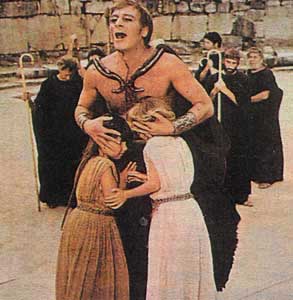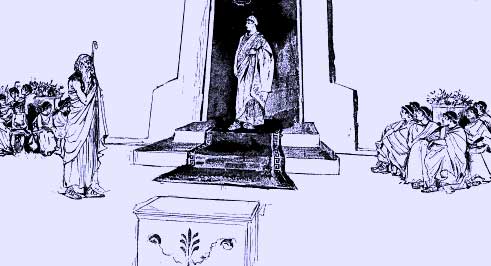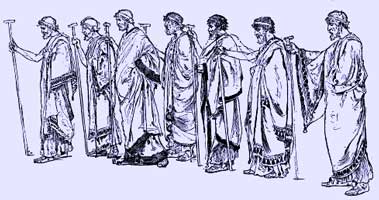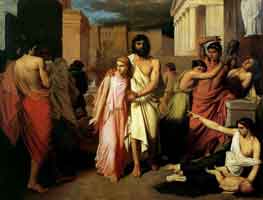- Thomas Francklin, 1759 - verse
- Edward H. Plumptre, 1865 - verse: full text
- Richard C. Jebb, 1904 - prose: full text
- Francis Storr, 1912 - verse: full text
- David Green, 1942 - verse
- Theodore Howard Banks, 1956 - verse
- Albert Cook, 1957 - verse
- Paul Roche, 1958 - verse
- H. D. F. Kitto, 1962 - verse
- Robert Fagles, 1984 - verse
- E.F. Watling. 1947
.

Oedipus the King, 1967 GB Philip Saville
Oedipus the King (also known as Oedipus Rex and Oedipus Tyrannos) is a Greek tragedy, written by Sophocles around 427 BC. The play was the second of Sophocles' three Theban plays to be produced, but its events occur before those of Oedipus at Colonus or Antigone.
The subject of the play is Oedipus, son of King Laius of Thebes and Queen Jocasta; a mythical character who was sent to be exposed on a mountainside as an infant in an effort to avoid a prophecy that he would kill his father. However, he was passed on to a shepherd and raised in the court of King Polybus of Corinth and his wife Merope. Hearing from an oracle that he was destined to kill his father and marry his mother, and believing Polybus and Merope to be his real parents, he left Corinth. Meeting Laius by chance on a road and not recognizing him, he became involved in a feud with him and killed him. Oedipus goes on to solve the Sphinx's riddle, and his reward for this is the kingdom of Thebes, and the hand of Jocasta; again, neither recognizes the other.

The play begins after Thebes has been struck with plague by the gods in outrage at Oedipus' unintentional wrongdoing. The play shows Oedipus' investigation, in which he curses and promises to exile those responsible for the murder. Although the blind prophet Tiresias explicitly tells Oedipus at the beginning of the play that he is the cause of the plague, Oedipus at first does not understand. Instead he accuses Tiresias of conspiring with Creon, Jocasta's brother, to overthrow him.
Oedipus then calls for a former servant of Laius, the only surviving witness of the murder, who fled the city when Oedipus became king. Soon a messenger from Corinth also arrives to inform Oedipus of the death of Polybus, whom Oedipus still believes is his real father, until the messenger informs him that he was in fact adopted. In the subsequent discussions between Oedipus, Jocasta, the servant, and the messenger, Jocasta discovers the truth and runs off; Oedipus learns the truth more slowly, but later runs off-stage as well. The chorus fills in the unseen details: Jocasta hanged herself, and Oedipus, upon discovering her body, blinds himself with the brooches of her dress. The play ends with Oedipus entrusting his children to Creon and going into exile, as he promised at the beginning.
The play depends very heavily on dramatic irony. At one point, Oedipus and Jocasta discuss the oracle, dismissing it as its prophecies have apparently not come to pass. The audience was expected to understand Oedipus' history well before he does.
Often missed by those reading the play is that the famous prophecy regarding Oedipus's fate has changed. Whereas Oedipus is told that he will murder his father and wed his mother, his parents were only told that their son would murder his father. It is because Jocasta tried to thwart fate and murder her own son that the penalty of incest was added to the prophecy. The sin belongs to her and not to Oedipus.
Interestingly, Oedipus is only mentioned once in the Iliad of Homer, where there is a reference to the king of Thebes dying in battle. This would suggest that before Sophocles it is possible that the story of Oedipus did not involve him blinding himself. If, indeed, this was an addition by Sophocles, it would explain why the references to sight in the early part of the play were not considered heavy handed by an audience that would be surprised when Oedipus appears on stage in the final scene blind.
Related articles
Translations

Sophocles, Oedipus the King (Modern Greek Text, PDF)
Enjoying "Oedipus the King", by Sophocles
|
|
Plays by Sophocles
|
DVD
Oedipus Rex , Sophocles- (1957) DVD - Starring: Naomi Cameron, Douglas Campbell Director: Tyrone Guthrie )and the later Star Trek Captain Kirk (wearing a mask)
| Ancient Greece
Science, Technology , Medicine , Warfare, , Biographies , Life , Cities/Places/Maps , Arts , Literature , Philosophy ,Olympics, Mythology , History , Images Medieval Greece / Byzantine Empire Science, Technology, Arts, , Warfare , Literature, Biographies, Icons, History Modern Greece Cities, Islands, Regions, Fauna/Flora ,Biographies , History , Warfare, Science/Technology, Literature, Music , Arts , Film/Actors , Sport , Fashion --- |
Retrieved from "http://en.wikipedia.org"
All text is available under the terms of the GNU Free Documentation License


